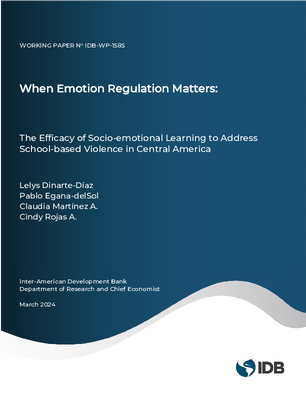When Emotion Regulation Matters: The Efficacy of Socio-Emotional Learning to Address School-Based Violence in Central America
Date
Mar 2024
After-school programs (ASP) that keep youth protected while engaging them in socio-emotional learning might address school-based violent behaviors. This paper experimentally studies the socio-emotional-learning component of an ASP targeted to teenagers in public schools in the most violent neighborhoods of El Salvador, Honduras, and Guatemala. Participant schools were randomly assigned to different ASP variations, some of them including psychology-based
interventions. Results indicate that including psychology-based activities as part of the ASP increases by 23 percentage points the probability that students are well-behaved at school. The effect is driven by the most at-risk students. Using data gathered from task-based games and AI-powered emotion-detection algorithms, this paper shows that improvement in emotion regulation is likely driving the effect. When comparing a psychology-based curriculum aiming to strengthen participants' character and another based on mindfulness principles, results show that the latter improves violent behaviors while reducing school dropout.
interventions. Results indicate that including psychology-based activities as part of the ASP increases by 23 percentage points the probability that students are well-behaved at school. The effect is driven by the most at-risk students. Using data gathered from task-based games and AI-powered emotion-detection algorithms, this paper shows that improvement in emotion regulation is likely driving the effect. When comparing a psychology-based curriculum aiming to strengthen participants' character and another based on mindfulness principles, results show that the latter improves violent behaviors while reducing school dropout.
Generative AI enabled





